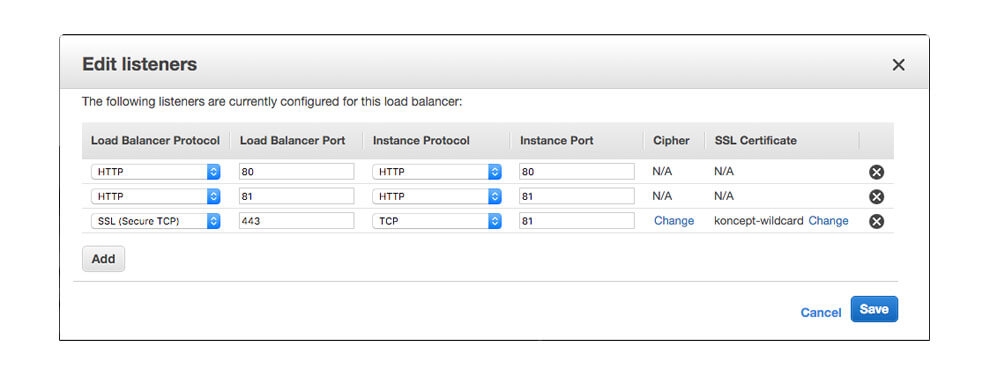UPDATE 2016/08/10: AWS improved their ELB and they now support websocket and http/2 protocols. More on this link https://aws.amazon.com/blogs/aws/new-aws-application-load-balancer/.
AWS ELB does not support WSS protocol on its HTTPS endpoints. If you are using it for load balancing this becomes a blocker for scaling your service. Hopefully there is a way to overcome this limitation.
Switching ELB protocols to TCP/SSL will not be enough as the server will not receive X-Forwarded-For header anymore.
To solve this you will need to
- Add ProxyProtocol policy to ELB so it starts using proxy_protocol
- Enable proxy_protocol support on nginx (Play unfortunatelly cannot be configured to understand proxy protocol at this moment :( )
Proxy protocol adds additional header to requests to pass server client’s ip which can be used if there is a load balancer between your server and clients.
How it looks?
PROXY_STRING + single space + INET_PROTOCOL + single space + CLIENT_IP + single space + PROXY_IP + single space + CLIENT_PORT + single space + PROXY_PORT + "\r\n"
Configuring ELB
Adding policy to ELB is for now only available through aws-cli. You can download it from here.
1. Add Policy
aws elb create-load-balancer-policy \
--load-balancer-name <AWS_ELB_NAME> \
--policy-name My-proxy-protocol \
--policy-type-name ProxyProtocolPolicyType \\
--policy-attributes AttributeName=ProxyProtocol,AttributeValue=True
2. Configure ELB
3. Configure nginx on your instance
Enable proxy_protocol support on nginx on your instance (and use it as a template for any other instance in your scaling pool).
# ELB PROXY protocol handler
server {
listen 81 proxy_protocol;
listen [::]:81 proxy_protocol;
server_name _;
root /var/www/html;
set_real_ip_from 172.31.48.0/20; # ELB CIDR
real_ip_header proxy_protocol;
proxy_set_header X-Real-IP $proxy_protocol_addr;
proxy_set_header X-Forwarded-For $proxy_protocol_addr;
location / {
proxy_pass http://127.0.0.1:9000/;
proxy_http_version 1.1;
proxy_set_header Upgrade $http_upgrade;
proxy_set_header Connection "upgrade";
proxy_set_header X-Forwarded-For $proxy_add_x_forwarded_for;
proxy_set_header Host $host;
}
}
Important notes:
- We use Nginx here to pass requests to Play running on port 9000 on the same instance.
- Port 80 is kept here to redirect requests to https and it cannot use proxy protocol as ELB will not enable proxy protocol on HTTP/HTTPS listeners (which is a must on port 80)
Here is a sample nginx configuration for port 80
# Redirect everything to https
server {
listen 80 default_server;
listen [::]:80 default_server;
server_name _;
return 301 https://$host$request_uri;
}
4. Attach policy to ELB
Attach policy to ELB so it adds proxy protocol to all requests that are passed to port 81 on the instance
aws elb set-load-balancer-policies-for-backend-server \
--load-balancer-name <ELB_NAME> \
--instance-port 81 \
--policy-names My-proxy-protocol
5. Open port 81 for EC2 security group :)
Just a reminder :)
6. Test it out
Test your setup by using 'wss://' in your requests. Websocket.org gives you an easy way to test websockets.

